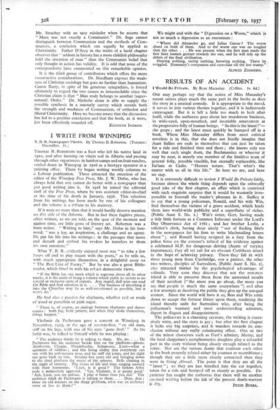I WRITE FROM WINNIPEG
THOMAS B. Rontarrox was a Scot who left his native land in 1910, and after farming on virgin soil in Alberta and passing
through other experiences in lumber camps and on fruit ranches, settled down in Winnipeg in 1916 as a linotype operator in a printing office. There he began writing weekly columns to :r Labour publication. These attracted the attention of the editor of the Winnipeg Free Press, Mr. J. W. Dafoe, who has . always held that one cannot do better with a newspaper than put good writing into it. In 1918 he joined • the editorial staff of the Free Press, where he was assistant editor-in-chief at the time of his death in January, 1936. This selection from his writings has been made by one of his colleagues and the volume is a tribute to his memory.
If it were no more than that it would hardly deserve mention on this side of the Atlantic. But in fact these fugitive pieces, often written, so we are told, on the spur of the moment and against time, are little gems of literary art. Robcrton was a born writer. "Writing to him," says Mr. Dafoe in his fore- word, "was a joy, an inspiration, a challenge and an agony. He put his life into his writings ; in the passages that move and disturb and enthral his readers he transfers to them his own emotions."
What T. B. R. evidently enjoyed most was "to take a few hours off and to play truant with the poets," as he tells us, with much appropriate illustration, in a delightful essay on "The Best Line of Poetry." But he was also a great Bible- reader, which fitted in with his robust democratic views.
"If the Bible has one merit which is supreme above all its other merit, it is the merit of being a volume which yields its secrets to no s2ecia1 or exclusive caste of experts. Any stupid, dull man can read the Bible and find salvation in it. . . . The business of absorbing it into the Churches may be as well-intentioned as possible, but it won't do."
He had also a passion for elephants, whether real or made of wood or porcelain or pink sugar.
"There is, of course, an analogy between elephants and demo- cracies: both big, both patient, and when they shake themselves, things happen."
_Vladimir de Pachmann gave a concert at Winnipeg in November, 1923, at the age of seventy-five, "an old man, stiff on his legs, with one of his eyes gone deaf.'" As his habit was, he talked to himself while he was playing : " The audience thinks he is talking to them. No, no. . . . De Pachmarm has his audience beside him on the platform—ghosts. Beethoven, Chopin, Mendelssohn, Schumann, Liszt—what a quintette of oddities ; and this living oddity that everybody can see, with his unfortunate nose, and his stiff old joints, and his right eye gone back on him. Seventy-five years old and bringing down to the dead platform the music of the spheres. Bells chiming in the night of eternity. The rivers of life and time surging onward with their harmonies. Liszt, is it good ?' The forlorn Abbe r.ods a melancholy approval. Yes, Vladimir, it is pretty good.' Ach, Liszt, you are jealous. I play it better than you did.' The audience think de Pachmann is talking to them.. . . Dear, dear ; those six old masters on the dingy platform, what was an audience more or less to them ? " _ We might end with the " D:gression on a Worm," which is not so much a digression as an encomium : " Where did Alexander go and Julius Caesar ? The worm dined on both of them. And to the worm one was no tougher than the other. . . . He was present when the first man made the first faint human gesture towards the sun, and he will tidy up the debris of the final civilisation. Hearing nothing, seeing nothing, knowing nothing. There he , wriggled. Humanity's companion and custodian till the last trump."
ALFRED ZIMMERN.














































 Previous page
Previous page